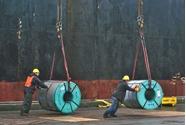Government/Policy

March 1, 2016
China, Japan, UK & Brazil Crushed in Cold Rolled Antidumping Ruling
Written by John Packard
This evening the U.S. Department of Commerce released their Preliminary Determinations on cold rolled from Brazil, China, India, Japan, Korea, Russia and the United Kingdom. Each country was found to be exporting cold rolled into the United States at less than fair value. However, the degree of the penalties ranged from a low of 2.17 percent (Hyundai in Korea) to as much as 265.79 percent for all Chinese producers.
A large buyer of both domestic and imported steel told SMU this evening after reviewing the ruling, “Big duties for Japan and Brazil will make traders be more cautious looking at replacement from other international origins. Certainly a wide section of the market wasn’t expecting these numbers. It’s a win for the domestic industry.”
We also heard from one of the foreign mills involved who told SMU the ruling was “bad news” for their company.
The following information is coming directly from the U.S. Department of Commerce “Fact Sheet” which Steel Market Update received this evening:
In the Brazil investigation, mandatory respondent Companhia Siderurgica Nacional received a calculated preliminary dumping margin of 38.93 percent. The second mandatory respondent, Usiminas Siderurgicas de Minas Gerais (Usiminas), did not respond to all of Commerce’s requests for information, and therefore received a dumping margin based on adverse facts available. Consistent with Commerce’s practice with regard to the application of facts available with adverse inferences, when determining a rate that is adverse, Commerce selects the higher of either the petition rate or highest calculated rate in the proceeding. Based on this, Usiminas and all other producers/exporters in Brazil also received a preliminary dumping margin of 38.93 percent.
In the China investigation, no company responded to Commerce’s requests for information. Accordingly, all producers/exporters in China received a preliminary dumping margin of 265.79 percent, based on adverse facts available.
In the India investigation, the sole mandatory respondent JSW Steel Limited/JSW Coated Products Limited received a preliminary dumping margin of 6.78 percent. All other producers/exporters in India received a preliminary dumping margin of 6.78 percent.
In the Japan investigation, mandatory respondents JFE Steel Corporation and Nippon Steel & Sumitomo Metal Corporation did not respond to Commerce’s requests for information. Accordingly, both mandatory respondents received a preliminary dumping margin of 71.35 percent, based on adverse facts available. All other producers/exporters in Japan received a preliminary dumping margin of 71.35 percent.
In the Korea investigation, mandatory respondents POSCO/Daewoo International Corporation and Hyundai Steel Corporation received preliminary dumping margins of 6.89 percent and 2.17 percent, respectively. All other producers/exporters in Korea received a preliminary dumping margin of 4.53 percent.
In the Russia investigation, mandatory respondents Joint Stock Company Severstal and Novolipetsk Steel OJSC received preliminary dumping margins of 12.62 percent and 16.89 percent, respectively. All other producers/exporters in Russia received a preliminary dumping margin of 14.76 percent.
In the United Kingdom investigation, mandatory respondents Caparo Precision Strip, Ltd. and Tata Steel UK Ltd. received preliminary dumping margins of 5.79 percent and 31.39 percent, respectively. All other producers/exporters in the United Kingdom received a preliminary dumping margin of 28.03 percent.







